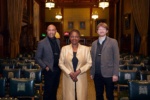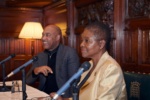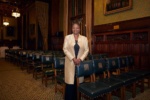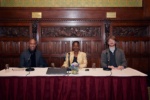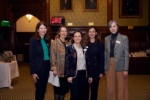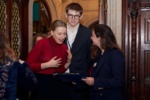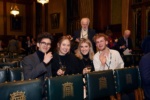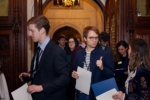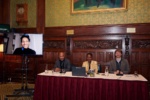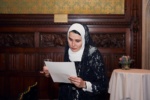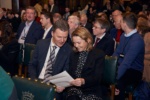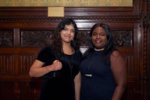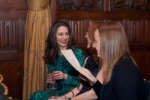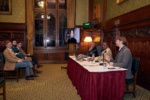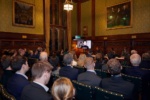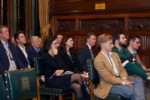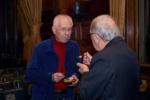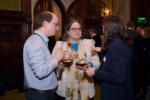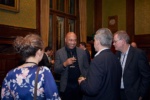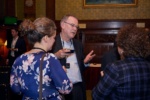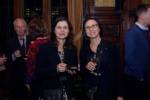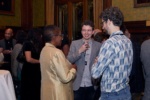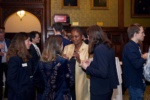Univ Seminar – Culture Wars: Who Owns History
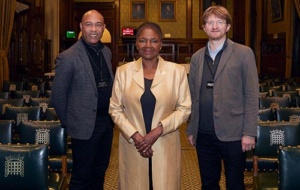 The Univ Seminar, “Culture Wars: Who Owns History”, took place on Thursday, 2 February 2023 live in The Members’ Dining Room, The House of Commons, London and online.
The Univ Seminar, “Culture Wars: Who Owns History”, took place on Thursday, 2 February 2023 live in The Members’ Dining Room, The House of Commons, London and online.
Baroness Amos, Master of Univ, hosted the discussion with panellists Afua Hirsch, Dr Casely-Hayford and Professor Ben Jackson (see biographies below), which was followed by both a Q&A and a chance to socialise with the speakers.
We hope you enjoy exploring the biographies, photographs and event report by Andy Baker (1984,PPE), and listening to the podcast below.
Panellists' Biographies
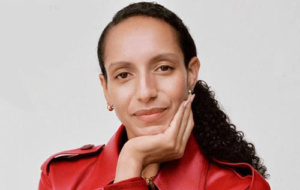 Afua Hirsch
Afua Hirsch
Afua Hirsch is an award-winning writer, broadcaster and former barrister known for her work on culture, social justice, identity and anti-racism.
Afua is the founder of Born in Me Productions, which creates scripted and non-scripted television, movies and podcasts, in partnership with Fremantle. She presents and produces non-scripted TV documentaries, including African Renaissance, a BBC series on African art, and Enslaved, a 6-part series about the transatlantic slave trade with Samuel L. Jackson, and a podcast series for Audible. She is creative chair of the Edinburgh TV Festival, the most prestigious TV event in the UK.
A journalist for more than twenty years, she has been a senior Guardian correspondent, Sky News editor, and freelance contributor to publications including the New York Times, Time Magazine and Vogue.
Afua’s bestselling book Brit(ish): On Race, Identity and Belonging is the winner of the Royal Society of Literature Jerwood Prize. Her other books include Equal To Everything, about the UK Supreme Court, and Empire: Look Again. She is currently the Wallis Annenberg Chair of Journalism at the University of Southern California in Los Angeles, and she holds a degree from Oxford University and honorary doctorates from London’s South Bank University and The University of Oxford Brookes.
Find out more at afuahirsch.com
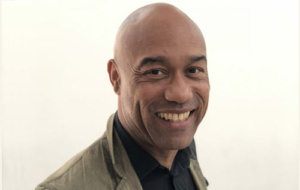 Dr Gus Casely-Hayford
Dr Gus Casely-Hayford
Dr Gus Casely-Hayford, OBE, is the Director of V&A East and Professor of Practice at SOAS, University of London.
Dr Casely-Hayford is the inaugural Director of V&A East, appointed in March 2020. He is a curator and cultural historian who writes, lectures and broadcasts widely on culture, having presented a number of series for Sky, BBC radio and television and other channels. Formerly Executive Director of Arts Strategy, Arts Council England, (Britain’s major Art’s funder) and Ex-Director of the Institute of International Contemporary Art, he has offered leadership to both large and medium-scale organisations including the Smithsonian National Museum of African Art. He has served on the boards of many cultural institutions, including the National Trust and the National Portrait Gallery. Gus has lectured widely on culture, including periods at Sotheby’s Institute, Goldsmiths, Birkbeck, City University, University of Westminster and SOAS. He has advised national and international bodies on heritage and culture including the United Nations and the Canadian, Dutch and Norwegian Arts Councils. In 2005 he deployed these leadership, curatorial, fundraising and communications skills to organise the biggest celebration of Africa Britain has ever hosted when more than 150 organisations put on over 1,000 exhibitions and events.
Gus gained a PhD from SOAS and was awarded an Honorary Fellowship. He is a Cultural Fellow of King’s College London, a Fellow of Jesus College, Cambridge, a Board Member of the Creative Industries Federation and a Trustee of the Karun Thakur Foundation. Gus is also a member of the Art Mills Museum Scientific Committee and the English Heritage Blue Plaques Committee. Gus was awarded an OBE in 2018.
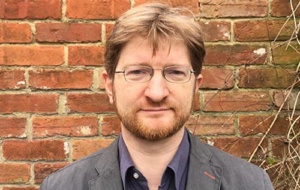 Professor Ben Jackson
Professor Ben Jackson
Professor Ben Jackson is Professor of Modern History at Oxford University and Leslie Mitchell Fellow of University College. He teaches and researches modern British history and the history of political thought. He is particularly interested in the role of ideas in political debate and public policy in the twentieth century and has written about topics such as the history of equality and inequality; the ideas of the free market right; and modern Scottish nationalism. He recently co-edited A Neoliberal Age? Britain Since the 1970s (UCL Press, 2021) and authored The Case for Scottish Independence: A History of Nationalist Political Thought in Modern Scotland (CUP, 2020). He is co-editor of the journal, The Political Quarterly.
Event Report
On Thursday 2 February, Univ held a seminar entitled “Culture Wars: Who Owns History” at the House of Commons.
I arrived early. I ignored the statue of Richard the Lionheart (each to his own, but I’ve never been much of a monarchist) and doffed my cap instead to Oliver Cromwell. Past security, through several glorious vault-ceilinged halls and into the Members’ Dining Room with, I would guess, some 80 fellow guests, plus those listening online. If those on the guest list turned up, then there were Univ alumni in the room who matriculated in every decade from the 1950s to the present.
The Master, Baroness Amos, welcomed everyone and set the scene. I won’t do justice to the arguments but there were some phrases and ideas that caught my ear. Professor Ben Jackson thought it a “strange idea that Britain is so insecure that it can’t take criticism” and cited the way Obama would acknowledge that the US hadn’t always measured up but also had “an enduring capacity for improvement”. The writer and broadcaster, Afua Hirsch, made a strong case that “we’ve been educated with a version of history designed to make us feel good about ourselves; we choose to celebrate a most exclusive, narrow view of history… and it’s uncomfortable to have that challenged.” I looked around the room as she spoke; as if supporting her view, looking down at us from on high were ten gilded paintings depicting historical characters and events from Parliament’s past… not much diversity in evidence there. And how impressive to hear Dr Gus Casely-Hayford, the inaugural director of the new V&A Museum East, making it his personal mission to visit every school in the four surrounding London Boroughs, taking artefacts with him from under-celebrated, under-explored parts of history. I know that days at school like that can inspire and stay with you for a lifetime.
My wife, Emma, and I stayed for a few drinks, nibbles and good conversation. I liked the fact that someone I’d not met before felt able to just walk up and introduce themselves although, I’m afraid, I’m not sure I held my end up in the ensuing conversation about AI and neuroscience! I was more on form later when Emma and I happened to leave at the same time as Dr Casely-Hayford; we walked out into the night air together, discussing the merits of siting the new V&A near my beloved West Ham’s football stadium.
I didn’t agree or feel comfortable with every comment made at the Seminar. I didn’t feel particularly knowledgeable at times. But it did make me think and I did feel in civilised company, able to air different views. A heady mix of feelings that reminded me of many Univ days.
Andy Baker (1984, PPE)
Podcast
All audio (c) University College, Oxford – podcasts may be downloaded for personal use only.


